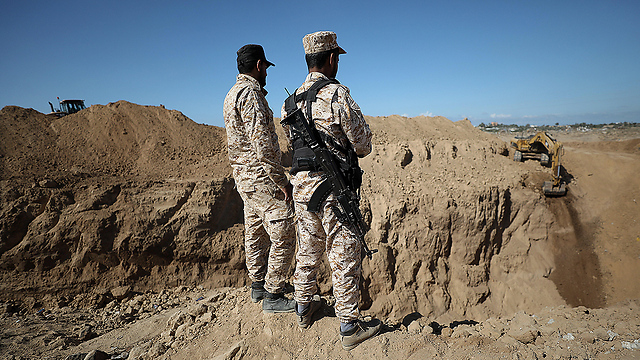Analysis: Islamic Jihad’s motivation to avenge the terrorist tunnel detonation is clear, and Hamas believes that it by spurring int. pressure on Israel to resume reconciliation talks. And when all interests to start a fire come together, that fire will burn.
The last two barriers putting off Islamic Jihad’s planned revenge for the recent detonation of a terrorist tunnel and the killing of 12 Palestinian terrorists have been removed in the past 48 hours.
The first barrier was breached over the weekend, when Islamic Jihad realized that four of its men who got trapped in the tunnel had been killed, and its attempts to reach the bodies or retrieve them from Israel would be unsuccessful. As soon as the hope to reach the bodies was removed, so was the barrier for carrying out an act of revenge.
The second barrier, the internal Palestinian reconciliation, has entered a slowdown to the point of paralysis. This faltering reconciliation, which still showed some signs of life up until a few days ago, has gotten caught in the rift between Iran and Saudi Arabia in Lebanon and in Yemen. The Saudis summoned Palestinian President Mahmoud Abbas out of the blue and basically demanded that he put a stop to the reconciliation moves as long as Hamas keeps flirting with the Iranians.

The Saudis are concerned that Hamas’ military wing, which has moved from Qatar to Beirut, will take over the Palestinian military force in Lebanon’s refugee camps and make it available to the Iranian axis. The Iranians have not kept quiet either, forcing a Hamas delegation from Qatar to pay an official visit to the Lebanese president in Beirut. A paralysis in the reconciliation moves reduces Hamas’ motivation to curb Islamic Jihad and maintain the calm on the Gaza-Israel border at all costs.
The coordinator of the government’s activities in the territories knew what he was doing Sunday, when he issued a direct warning to Islamic Jihad. Israel knows, according to reports, that the instructions for the act of revenge have already been issued by Islamic Jihad headquarters in Damascus.
It’s quite likely that Israel has some idea about the intentions and preparations on the other side, but there could always be a surprise that would claim a heavy price. Israel is therefore still trying to use deterrence: Issuing public warnings, conveying secret messages and boosting its alertness and visible military presence, including a Southern Command drill in the Gaza Strip.
Meanwhile, the Palestinian media outlets in Gaza are inflaming the winds of war and claiming that Israel is trying to heat up the border, offering accounts allegedly taken from border observers’ reports. Israel, according to the reports, is operating unmanned vehicles, jeeps and Hummers, along the border. According to other reports, Israel has increased its use of pilot balloons, which are carrying unusually big electronic systems, and is operating an unusual number of UAVs in the sky. Furthermore, they say the IDF is building ramps for tanks, that the work on the security fence has been stopped and that so has the Israeli agricultural activity along the border.
The entire set is ready for a flare-up. Israel has no interest in the Palestinian reconciliation agreement, so its response to any attempted attack on communities or soldiers—or an attack in any other area outside the Gaza Strip—might be perceived as disproportionate.
Islamic Jihad’s motivation for revenge is clear. Hamas believes that by starting a limited fire, it will spur American and Egyptian pressure on Israel to hold its fire—and pressure on the Palestinian Authority to resume the reconciliation talks. And when all interests to start a fire come together, the fire will burn.
As reported by Ynetnews
